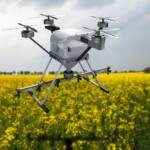No products in the cart.

Introduction to Drone Farming
| Heading |
|---|
Introduction to Drone Farming |
| What is Drone Farming? |
| Benefits of Drone of Farming |
| Increased Efficiency |
| Crop Monitoring |
| Pest and Disease Management |
| Precision Agriculture |
| Environmental Impact |
| Challenges of Drone of Farming |
| Cost |
| Regulatory Issues |
| Limited Payload Capacity |
| Conclusion |
| FAQs |
Introduction to Drone Farming
In today’s world, where technology is constantly evolving, agriculture is not left untouched. One such revolutionary concept making waves in the agricultural sector is drone farming. Let’s delve deeper into what exactly drone farming entails and why it’s becoming increasingly popular among farmers.

What is Drone Farming?
Drone of farming, also known as precision agriculture or smart farming, involves the use of unmanned aerial vehicles (UAVs) or drones to monitor, manage, and optimize agricultural activities. These drones are equipped with various sensors and cameras that collect data, providing valuable insights into crop health, soil conditions, and other crucial factors affecting farming.
Benefits of Drone of Farming
- Increased Efficiency: Drones enable farmers to cover large areas of land quickly and efficiently, reducing the time and labor required for traditional methods of crop monitoring and management.
- Crop Monitoring: With high-resolution cameras and sensors, drones can capture detailed imagery of crops, allowing farmers to identify issues such as nutrient deficiencies, irrigation problems, or pest infestations early on.
- Pest and Disease Management: Drones equipped with infrared cameras can detect signs of pest infestations and diseases in crops, enabling farmers to take proactive measures to prevent widespread damage.
- Precision Agriculture: By analyzing the data collected by drones, farmers can implement precise farming techniques, such as targeted irrigation and fertilization, leading to optimized crop yields and reduced resource wastage.
- Environmental Impact: Drone of farming promotes sustainable agriculture by minimizing the use of chemicals and resources, thereby reducing environmental pollution and conserving natural resources.
Challenges of Drone of Farming
Despite its numerous benefits, drone of farming also faces several challenges that need to be addressed for widespread adoption:
- Cost: The initial investment in drones and related technology can be prohibitive for small-scale farmers, limiting their access to this advanced farming technique.
- Regulatory Issues: There are regulatory constraints regarding the use of drones in agriculture, including airspace regulations and privacy concerns, which need to be navigated carefully.
- Limited Payload Capacity: Most drones have limited payload capacity, restricting the types of sensors and equipment that can be carried, thereby limiting their functionality.
Conclusion
In conclusion, drone of farming holds immense potential to revolutionize the agricultural industry by offering farmers innovative solutions to improve efficiency, productivity, and sustainability. However, overcoming the challenges associated with its adoption is crucial for realizing its full benefits and ensuring its widespread implementation in farming practices.
FAQs
- Are drones only used for monitoring crops in drone of farming? Drones are primarily used for crop monitoring in drone of farming, but they can also be utilized for tasks such as crop spraying and aerial seeding.
- How accurate are the data collected by drones in agriculture? The data collected by drones in agriculture is highly accurate, providing farmers with detailed insights into crop health, soil conditions, and other important parameters.
- Can drones help reduce water usage in agriculture? Yes, drones can help reduce water usage in agriculture by enabling farmers to implement precision irrigation techniques based on real-time data and crop requirements.
- Are there any legal restrictions on using drones for farming? Yes, there are legal restrictions on using drones for farming, including airspace regulations and privacy laws that farmers need to comply with.
- What are some future developments expected in drone of farming? Future developments in drone of farming may include advancements in drone technology, such as increased payload capacity, longer flight times, and more sophisticated sensors, further enhancing its capabilities in agriculture.
Go and turn on towards organic farming to save future and thire save childs:
Elevate Plant Growth with Premium Bone Powder – Buy Now!
Organic Cow Dung Compost: Transform Your Garden Naturally
Premium Humic Acid for Healthy Plants | Enhance Soil & Boost Growth
Boost Plant Growth Naturally with Mustard Cake | Organic Fertilizer
Transform Your Garden with NPK Fertilizer | Boost Growth by 30%
Premium Perlite for Enhanced Gardening | Buy Now
Live Earthworms with Enhance Your Garden (soil health)
1 Neem Khali: Unveiling the Wonders of Nature
1Transform your garden with vermiwash-buy now
1 Premium quality Vermicompost [ केचुआ खाद ]
Follow us:



